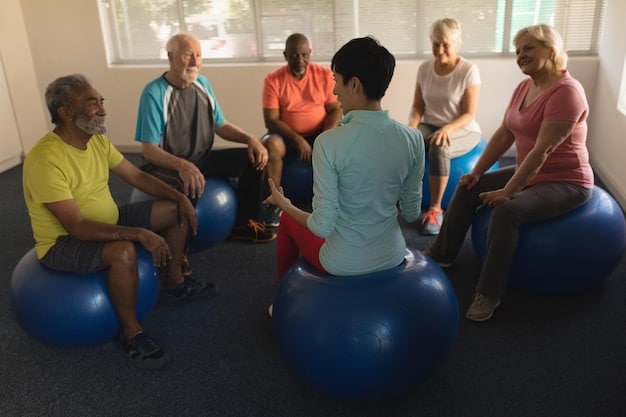Adult Day Care Centers: Your Guide to Choosing the Best Option

Adult day care centers provide a supportive and engaging environment for seniors and adults with disabilities, offering a safe alternative to staying home alone while also providing respite for caregivers.
Navigating the options for elder care can feel overwhelming. Among the various choices available, adult day care centers offer a valuable service for seniors who need supervision or assistance during the day.
Understanding Adult Day Care Centers
Adult day care centers bridge the gap between independent living and more intensive care settings. They provide a structured and supervised environment for adults who may need assistance with daily activities or who benefit from social interaction.
These centers aren’t just a place to pass the time; they’re often vibrant communities that offer a range of activities designed to promote physical, cognitive, and emotional well-being.
Who Benefits from Adult Day Care?
Adult day care can be a great option for seniors and adults with disabilities who can no longer stay home alone safely but don’t require 24-hour care. It’s also a lifeline for caregivers who need a break from the demands of caregiving.
- Seniors with cognitive impairments like Alzheimer’s disease or dementia.
- Adults with physical disabilities that limit their independence.
- Individuals recovering from surgery or illness.
- Seniors feeling isolated or lonely.
What Services Do They Offer?
The services offered at adult day care centers can vary, but they typically include:
- Social and recreational activities like games, crafts, and music.
- Nutritious meals and snacks.
- Assistance with personal care, such as toileting and bathing.
- Medication management.
- Therapeutic activities, such as physical or occupational therapy.
In conclusion, adult day care centers provide a structured and supportive environment for seniors and adults with disabilities. These centers are designed to promote physical, cognitive, and emotional well-being, offering a valuable resource for both participants and their caregivers.

Key Features to Look for in a Quality Center
Not all adult day care centers are created equal. It’s important to research and visit several centers to find one that meets your loved one’s specific needs and preferences.
Pay close attention to the environment, staff qualifications, and the types of activities offered when making your decision.
Clean and Safe Environment
The center should be clean, well-maintained, and free of hazards. Look for:
- Adequate lighting and ventilation.
- Accessible restrooms and doorways.
- Secure outdoor areas.
- Emergency procedures and safety protocols in place.
Qualified and Compassionate Staff
The staff is the heart of any adult day care center. They should be:
- Trained in elder care and first aid.
- Patient, respectful, and attentive.
- Adequately staffed to meet the needs of the participants.
- Experienced in working with individuals with cognitive and physical limitations.
An attentive, experienced and compassionate staff is critical to providing effective care and providing the peace of mind that comes with knowing a loved one is well cared for.
Engaging and Varied Activities
A good center will offer a variety of activities that cater to different interests and abilities. Consider:
- Cognitive stimulation activities like puzzles, games, and discussions.
- Physical activities like exercise classes, walking groups, and gardening.
- Creative activities like art, music, and drama.
- Social activities like group outings, birthday celebrations, and holiday parties.
In conclusion, when evaluating adult day care centers, prioritize those with clean and safe environments, qualified and compassionate staff, and engaging and varied activities. These features ensure a positive and enriching experience for your loved one.
Assessing the Center’s Program and Activities
Beyond the basics, the program and activities offered by an adult day care center are crucial to ensuring your loved one’s engagement and well-being.
A well-rounded program can improve cognitive function, physical health, and overall quality of life.
Personalized Care Plans
A good center will develop individualized care plans for each participant, taking into account their specific needs, preferences, and goals. This involves:
- Assessing the individual’s physical and cognitive abilities.
- Identifying their interests and hobbies.
- Setting realistic goals for participation and improvement.
- Regularly reviewing and updating the care plan as needed.
Specialized Programs for Specific Needs
Some centers offer specialized programs for individuals with specific conditions, such as Alzheimer’s disease, Parkinson’s disease, or stroke. These programs may include:
- Cognitive therapy and memory training.
- Physical and occupational therapy.
- Speech therapy.
- Support groups for participants and caregivers.
It is important to understand the programs available and how they align with the specific needs of any potential client.
Community Involvement and Outings
Engaging with the community can provide participants with a sense of purpose and belonging. Look for centers that offer:
- Trips to local museums, parks, and cultural events.
- Volunteer opportunities.
- Intergenerational programs that connect participants with children and young adults.
In conclusion, when assessing an adult day care center, evaluate the personalization of care plans, the availability of specialized programs, and the extent of community involvement. These factors contribute to a more enriching and fulfilling experience for your loved one.
Evaluating the Staff-to-Participant Ratio
The staff-to-participant ratio is a critical indicator of the level of care and attention that participants will receive at an adult day care center.
A lower ratio generally means more individualized attention and a safer environment.
Understanding the Ideal Ratio
While there is no single ideal ratio, a general guideline is one staff member for every six to eight participants. However, this can vary depending on the needs of the participants.
For example, a center that serves individuals with significant cognitive or physical limitations may require a higher staff-to-participant ratio.
Observing Staff Interactions
During your visit, pay attention to how the staff interacts with the participants. Are they attentive, responsive, and patient? Do they seem genuinely engaged in their work? How are the interactions with patients with special needs and challenges?
Look for signs that the staff is able to provide individualized attention and support to each participant.
Asking About Staff Training and Turnover
Inquire about the staff’s training and experience, as well as the center’s staff turnover rate. High turnover can be a sign of problems with management or working conditions, which can negatively impact the quality of care.
Ideally, the staff should have specialized training in elder care, dementia care, and first aid.
In conclusion, a favorable staff-to-participant ratio is essential for high-quality care in adult day care centers. Evaluate the ratio, observe staff interactions, and inquire about training and turnover rates to ensure your loved one receives adequate attention and support.

Cost Considerations and Payment Options
Understanding the cost considerations and payment options for adult day care centers is essential for making an informed decision.
The cost can vary widely depending on the location, services offered, and the level of care required.
Typical Costs and Fees
Adult day care costs are typically lower than in-home care or assisted living facilities. Costs generally averages $75 a day, but can range from $40 to over $100 per day. The cost can be affected by location, specialization and other amenities offered.
Ask about all the fees associated with the center, including daily rates, transportation fees, and activity fees.
Payment Options
There are several ways to pay for adult day care, including:
- Private pay: This is the most common payment method, using personal funds.
- Long-term care insurance: Some long-term care insurance policies cover adult day care.
- Medicaid: In some states, Medicaid may cover adult day care for eligible individuals.
- Veterans benefits: The Department of Veterans Affairs (VA) may offer financial assistance for adult day care to eligible veterans.
Financial Assistance Programs
Explore available financial assistance programs, such as:
- State and local government programs.
- Nonprofit organizations that provide financial aid to seniors and caregivers.
- Tax deductions for elder care expenses.
In conclusion, understanding the cost and exploring various payment options are crucial when choosing an adult day care center. Consider private pay, insurance, Medicaid and financial assistance programs to make find a solution that fits within your budget.
Visiting and Evaluating Potential Centers
The best way to determine if an adult day care center is the right fit for your loved one is to visit and evaluate potential centers in person.
A thorough visit allows you to assess the environment, observe staff interactions, and get a feel for the overall atmosphere.
Scheduling a Visit
Call the center to schedule a visit and ask if you can bring your loved one along. This will give them an opportunity to experience the center firsthand and see if they feel comfortable there.
When scheduling, inquire about visiting during activity times to observe staff and patient interactions.
Key Questions to Ask
Prepare a list of questions to ask during your visit, covering:
- The center’s philosophy of care.
- The staff’s qualifications and training.
- The types of activities offered.
- The staff-to-participant ratio.
- The cost and payment options.
Trusting Your Gut
Ultimately, the best way to choose an adult day care center is to trust your gut. Does the center feel welcoming and supportive? Do you feel confident that your loved one will be safe and well cared for there?
Pay attention to your instincts and choose the center that feels like the best fit for your family.
In conclusion, visiting and carefully evaluating potential adult day care centers is crucial. By scheduling visits, asking key questions, and trusting your instincts, you can find a center that provides a safe, supportive, and enriching environment for your loved one.
Preparing Your Loved One for the Transition
Transitioning to an adult day care center can be a big adjustment for your loved one. Careful preparation can help make the process smoother and more positive.
Open communication, gradual integration, and ongoing support are essential for a successful transition.
Open Communication and Explanation
Talk to your loved one about the benefits of adult day care and explain why you think it would be a good fit for them. Focus on the social aspects, the opportunity to engage in new activities, and the chance to make new friends.
- Explain what the center offers and the activities they can participate in.
- Assure them that you are still involved in their care and that you are doing this to improve their quality of life.
Gradual Integration
Start by having your loved one attend the center for a few hours at a time, gradually increasing the length of their visits as they become more comfortable. The center should work with your loved one for proper integration.
- Consider starting with one or two days a week and then increasing to more days as needed.
- Encourage them to participate in activities they enjoy.
Ongoing Support Post Transition
Follow up with your loved one after each visit and ask about their experiences. Address any concerns or anxieties they may have. Be patient and supportive, and remind them of the positive aspects of attending the center.
- Talk about the new friends they have made and people at the center.
- Regularly assess the patient’s needs and consult with the staff.
In conclusion, preparing your loved one for the transition requires open communication, gradual integration, and ongoing support. By addressing their concerns, providing encouragement, and remaining actively involved in their care, you can help them embrace adult day care as a positive and enriching experience.
| Key Point | Brief Description |
|---|---|
| 🤔 Understanding Needs | Assess the specific care requirements of the senior to find a suitable center. |
| 🧐 Center Features | Look for cleanliness, safety, qualified staff, and engaging activities. |
| 💰 Cost & Payment | Explore payment options, including private pay, insurance, Medicaid, and veteran benefits. |
| 🤝 Trial Visits | Schedule trial visits to assess the center’s fit and ensure comfort. |
Frequently Asked Questions (FAQs)
▼
Adult day care provides care in a group setting outside the home, offering social interaction and activities. In-home care provides one-on-one care at the individual’s residence, focusing on personal assistance and medical needs.
▼
Consider your loved one’s needs for socialization, supervision, and assistance with daily activities. If they are otherwise safe and healthy, but need care due to age or circumstance, it may be appropriate.
▼
Activities vary but often include cognitive exercises like puzzles and games, physical activities such as exercise classes, creative arts and crafts, and social engagements such as community outings and group celebrations.
▼
Online directories, local senior centers, and referrals from healthcare providers can assist you in locating adult day care centers in your area. Visiting each option and asking the right questions is always recommended.
▼
Requirements vary by respective country and state. Reputable centers will be licensed and inspected regularly to ensure they meet safety and quality standards, so thoroughly researching beforehand is always wise.
Conclusion
Choosing the right adult day care center involves careful consideration of various factors, including the center’s features, staff qualifications, programs, costs, and your loved one’s individual needs. By following these guidelines and visiting potential centers, you can find a supportive and enriching environment that enhances your loved one’s quality of life and provides peace of mind for you.





